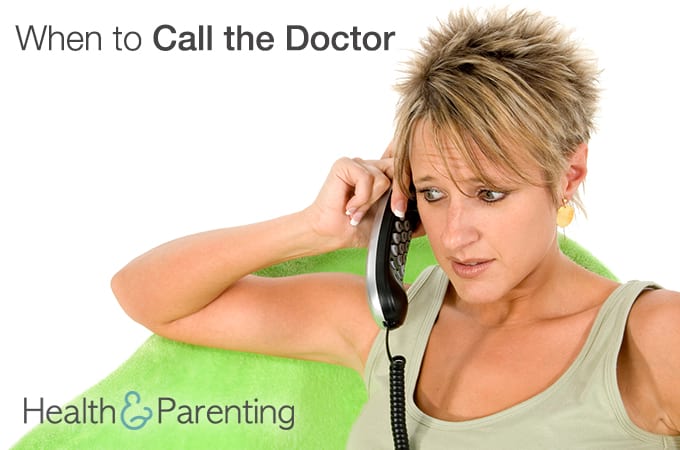New parents sometimes don’t want to be seen as overprotective by calling the baby’s doctor at the least little change in baby’s behavior. How are you to know when you should get professional help, and when your baby isn’t really in need of medical attention?
While every healthcare provider is different, here are some general rules about when to call the doctor and what you might do at home:
- Any fall by a baby, especially if he hit his head and even if he’s acting normal. Sometimes changes may take a while to show up, but you want to catch any problems before they cause too much damage to baby’s growing brain.
- Excessive crying after eliminating all common causes. Keep this relative to how much your individual baby typically fusses. Try diaper changes, feeding, burping, changing clothes, checking to be sure toes and fingers aren’t caught in strings or hair (you’d be surprised how often this happens!), etc. If your baby is inconsolable and will not sleep, call the doctor.
- Excessive drowsiness, especially if baby can’t be roused for feedings. Babies may occasionally miss a feeding, but if your baby misses more than one, he may be ill.
- Fever greater than 101°F (38°C), especially if baby is younger than 2 months. Some healthcare providers will recommend over-the-counter fever reducers, but some will want to check baby first.
- Projective vomiting. This is more forceful and copious than normal spit-up. If it’s happening repeatedly, your baby will need to be kept hydrated. If you’re breastfeeding, keep trying to nurse.
- Diarrhea or blood / mucous in baby’s stools. If your baby has more than 10 watery stools in one day, this is considered diarrhea. Keep your baby hydrated and seek medical attention.
- Cough or severe runny nose, especially if accompanied by a fever or if baby is tugging on his ears, too. You might use a nasal aspirator, saline drops or a humidifier to keep your baby comfortable, but you want to rule out infection.
- Discharge from the eyes. Some newborns have blocked tear ducts, which is typically harmless. But older babies with sudden eye irritation should be checked for infection
- If your baby has difficulty breathing or has been exposed to any toxic substance, call your local emergency providers immediately.
The list above is of course not complete, there may be many other instances where it is best to call your doctor. The number one rule is to trust your instincts. If you think your baby needs to be seen by a healthcare provider, be persistent until you have your needs met. You know your baby best – in health and in illness!
Written by Michelle, childbirth instructor, lactation consultant, and mother to 4 busy kids
This information is not intended to replace the advice of a trained medical doctor. Health & Parenting Ltd disclaims any liability for the decisions you make based on this information, which is provided to you on a general information basis only and not as a substitute for personalized medical advice. All contents copyright © Health & Parenting Ltd 2016. All rights reserved.










